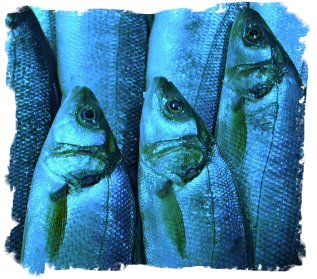
At the northwestern edge of the United States, a left arm of the ocean thrusts into the continent up to its shoulder as if fishing for a lost wedding ring with its fingers. My home is at the inside bend of its elbow.
Offshore, pods of orca whales hunt for seals and salmon, crabs crawl sideways like promises and scallops rest on beds of sand, the two halves of their open ribbed shells framing rows of bright blue eyes. I often walk the tideline, find whips of kelp ripped from their moorings by winter storms. Sliced into rounds, their stalks make excellent pickles.
I eat nearly all things piscatorial: halibut, sea cucumber, dogfish, scallops, clams (butter, manila, razor, geoduck), rockfish, octopus, squid, oysters, mussels, tuna, flounder, sole, snapper, silverbrite and steelhead. It says something about the eating habits in my small town that there are two sushi restaurants. Like orcas, I prefer my salmon raw.
It also says something about me that I like to rise early and scull about in the dark, testing the edges of my vision. Even though some nights teem with deep and dangerous carnivores, there’s also that other, old, familiar side of sleep that smells of warm dust, crumbled leaves and the safe burrows of my dreams. Half fish, half mammal, my brain slowly rises, finds the equilibrium that it needs to survive the light. Rarely is it startled awake.
Unless, of course, I find thermonuclear garbage under the kitchen sink.
Lumps of ice blue light glow behind plastic walls as if tiny newborn stars had fallen in with potato peels and paper towels. My mammal brain snaps to attention. I bend down and peer in, ready to leap back at the first surge of adrenaline. One finger with a mind of its own reaches out and gives the garbage a poke.
Nothing.
Nails of thumb and forefinger pinch the edge of evidence and the light rises. I switch on a flashlight. Miniscule globs of gelatin stick to the waxed paper that wrapped last night’s shrimp.
I switch off the light. The gelatin exhales the cold blue breath of plankton, tiny marooned luminous lives.
Submerged, out of my depth, I stare over the sink out the window at Venus, a silver hole in the big, briny sky. Starfish eyes too numerous to count swirl around her. They wink out one by one as the brine dilutes to dawn. Venus recedes into the brightening abyss.
The blue garbage under the sink fades. Although it still glows, there is too much other light for my eyes to see it.
I rise to the day’s surface, gulp air and drag myself ashore.
Cheryl Merrill lives and works in Port Townsend, Washington. Her publications include poems in Paintbrush, Northwest Review, Willow Springs and others; poems anthologized in A Gift of Tongues: 25 Years of Poetry from Copper Canyon Press; a chapbook of poems, Cheat Grass from Copper Canyon Press in 1975; and more recent publications of a photo-essay series about elephants in Iron Horse Literary Review and in The Drexel Online Journal as well as excerpts from her book in Fourth Genre, and Isotope. She is currently working on a book about elephants: Shades of Gray.
